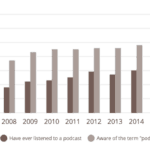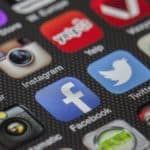The Future of Audiobooks

I was listening to No Such Thing As a Fish, the podcast from the elves behind QI, the other day, and they were trailing their Book of the Year 2018 and its related audiobook. The book is, essentially, a hard copy version of their wildly successful podcast (it gets around 6m listeners a month which is pretty much all that a British podcast could dream of) which makes sense in terms of broadening their appeal and earning a bit more money. But the audiobook version is not a simple monotone rendition of the book, it is, essentially, their podcast. It’s funny and chatty, and has all the hosts chipping in in a manner that sounds unrehearsed. Exactly like the podcast. Except you pay £19.99 for it.
I struggle with the logic of making an audiobook of a book of a podcast (which is, once the equation is reduced, an audiobook of a podcast) but it got me thinking about the relationship between audiobooks and podcasts.
I’ve always been a big audiobook fan. As a kid I can remember perusing the racks of audiobooks in Waterstones (or Ottakar’s as it was then) and systematically making my way through Bernard Cornwell’s Sharpe novels via the cassette tapes in my school library. Even through the course of two English degrees, I kept using audiobooks as a time-saving mechanism (and because I’m someone who is instinctively at home with a pair of headphones on).
But the market for audiobooks has changed. A few years ago I was working in a bookshop in London, and the audiobook section wasn’t how I remembered it from my childhood. Firstly, it was tiny, secondly, it was behind the counter, and, thirdly, no-one ever bought anything from it. Honestly, I must’ve sold a half dozen audiobooks at most over the course of a year. And it makes sense, because hard copies of audiobooks are a pretty wild investment to make in 2019. If someone bought me a CD audiobook now, I wouldn’t know what to do with it. I don’t have a CD player or walkman; my MacBook doesn’t have a disc drive. So the industry has entirely and sensibly migrated to digital copies, with Amazon’s Audible (a company it acquired for $300m in 2008) being the new market leader. Either way, audiobooks are a mini-boom industry with a reported 21.5% growth from 2016 to 2018 and sales of $2.5bn (net revenue for hard copy book publishing in the US in 2017 was $26.23bn, as a point of comparison).
So audiobooks are thriving and that’s great. Unlike their papery forebears, they are just reaching the point where technology is compatible with the medium. Personally, I find the Audible model stingy — for $14.95 a month you get one credit to use on an audiobook — compared to the buffet style offering you get at Netflix for $10.99. And it’s not as though films and TV have traditionally be priced lower than books — yes, there has always been a certain amount available on terrestrial TV or cable subscription which feels more like an all-you-can-eat service, but, equally, we’re all familiar with the concept of a library — or are more expensive to make. This latter point I find more puzzling. Audiobooks are cheap, cheap, cheap to make (audiobook professionals, feel free to email me correcting hate mail!). You need a voice actor — I’m not convinced star power carries much weight, unless you’re Stephen Fry doing the Harry Potter books (and, even then, you have the advantage of selling Harry Potter) — a studio, engineers, editors…etc but compared to the scale of the vast majority of media production, this is pretty small fry. A 20-hour audiobook isn’t wildly dissimilar to producing a 20-hours of podcasts, something which many podcast producers will do over the course of a month or so.
And yet, £19.99 — the cost of the Book of the Year 2018 audiobook — is a standard price to pay for this content. I have, broadly, two points of interest here:
- Audible are acquiring skin in the game (which makes them sound like serial killers) when it comes to podcasts. I think it will ultimately make sense that they will need to offer more for the subscription fee (and make their trial period less easy to game) as the VOD providers up their output. I wonder whether, eventually, Audible will be rolled into Amazon Prime Video — a move that would make that subscription really sexy (remember that Jeff Bezos also owns the Washington Post, and you can see how you could put together an uber-paywall package which, if the price was right, could solve all your media and journalism needs). But putting Audible aside, I do think there’s a space for podcasts to intersect with the audiobook space and drink some of their milkshake. The folk at LibriVox have been trying to do this with public domain texts and I admire their work from an educational standpoint, but is that the only way? At the moment, the largest audiobook provider in the world is overpriced — not just by a little, by a lot — and that should look like a big shining opportunity to someone.
- How do audiobooks interact with print sales? I suspect the markets are quite separate and that if I buy the latest Dan Brown in hardback, I won’t shell out the same price again to hear Paul Michael narrate it. But we all know that fiction, particularly non-genre or literary fiction, and non-fiction that isn’t self-help or MBS, has struggled for a while and will continue to struggle. The shape of the market has changed. I remember, back in the early days of Netflix, that there was a period where certain Blu-Ray providers would challenge the emerging hegemony by offering a code for a digital download (I think, if I remember rightly, via iTunes) as an add-on to the Blu-Ray addition. They may well still do this, I just haven’t bought a Blu-Ray in about 5 years. Could something like this help make a hard copy book a more attractive prospect?
To expand, just quickly, on that final idea: If I was MD of Harper Collins (which I’m not *sad face*) I would get the boffins to work on some Harper Collins owned app, let’s call it BookWorm. BookWorm would have access to the entire Harper Collins audiobook library, but would only be able to download or stream content if the user inputs a code from a hard copy of the book (you might have to do some sort of scratch to reveal in order to stop people cheating the system; though would they really?). The audiobook, as it’s presented in the BookWorm app would be linked to the edition of the book purchased and therefore when you’re listening to the audiobook and pause it, it could tell you which page to go to. And vice versa: if you’re reading the book but want to go for a jog and pick it up in your headphones, just input the page number and the audiobook starts from there. It would be a great way of i) integrating audio and print media, ii) incentivising the purchase of hard copy books, and iii) getting people to install a Harper Collins owned app on their phone! (Publishing head honchos: please come and get me).
Essentially, I think that audiobooks could be more like podcasts. They could be more flexible, more interactive, more willing to explore the possibilities of a low cost medium. For how long will you be able to sell an audiobook for £19.99 when 70 years of Desert Island Discs archives are available for free as podcasts? For how long will $14.95 seem like an acceptable deal for Audible when your Netflix bill is four bucks cheaper, and the entirety of the Apple Podcasts library is available for free? Audiobooks are a boom industry because suddenly it has become possible to streamline their sale in a way that the industry has been waiting decades for. But as with any industry that’s doing well and has one big fish in its small pond, there are many forces that could yet disrupt the ecosystem. In order to do something interesting with the longterm future of audiobooks, it’d be worth taking a look at the programming on the other side of the ink and paper divide.













Comments
Comments are closed.